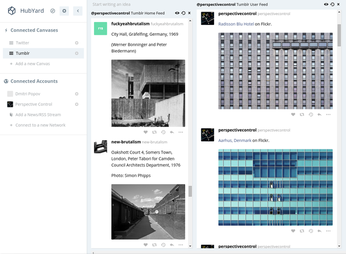Keep Tabs on Social Media Accounts with HubYard

Productivity Sauce
Twitter, Tumblr, RSS, YouTube, Instagram -- there is a myriad of sources that compete for your attention. To make matters worse, each service wants you to use its own app or website, so things can quickly get out of hand if you need to keep up with all your social media services. Enter HubYard -- an open source platform for aggregating and managing social media accounts.
HubYard's concept and implementation bear a lot of similarities to existing commercial social media aggregators like HootSuite. You can link your social media accounts to your HubYard profile and use the application's features to read and manage streams. The current list of supported services includes the usual suspects like Twitter, Tumblr, YouTube, Instagram, Facebook Pages and a few others. HubYard can also manage RSS feeds, so even if social media are not your cup of tea, you can still use the application as a regular RSS aggregator. To manage multiple sources, HubYard lets you create canvases, or boards, which you can populate with panels containing different streams. For example, you can create separate canvases for RSS feeds and Twitter streams. The text area in the upper-left corner of each panel can be used to post updates to social networks. But it seems that only posting to Twitter is currently implemented, though.
HubYard's source code (sans certain proprietary parts like Google Analytics and DataStack) is available on GitHub, so you can host it on your own server, or tweak and improve the application to your heart's content.
comments powered by DisqusSubscribe to our Linux Newsletters
Find Linux and Open Source Jobs
Subscribe to our ADMIN Newsletters
Support Our Work
Linux Magazine content is made possible with support from readers like you. Please consider contributing when you’ve found an article to be beneficial.

News
-
Introducing matrixOS, an Immutable Gentoo-Based Linux Distro
It was only a matter of time before a developer decided one of the most challenging Linux distributions needed to be immutable.
-
Chaos Comes to KDE in KaOS
KaOS devs are making a major change to the distribution, and it all comes down to one system.
-
New Linux Botnet Discovered
The SSHStalker botnet uses IRC C2 to control systems via legacy Linux kernel exploits.
-
The Next Linux Kernel Turns 7.0
Linus Torvalds has announced that after Linux kernel 6.19, we'll finally reach the 7.0 iteration stage.
-
Linux From Scratch Drops SysVinit Support
LFS will no longer support SysVinit.
-
LibreOffice 26.2 Now Available
With new features, improvements, and bug fixes, LibreOffice 26.2 delivers a modern, polished office suite without compromise.
-
Linux Kernel Project Releases Project Continuity Document
What happens to Linux when there's no Linus? It's a question many of us have asked over the years, and it seems it's also on the minds of the Linux kernel project.
-
Mecha Systems Introduces Linux Handheld
Mecha Systems has revealed its Mecha Comet, a new handheld computer powered by – you guessed it – Linux.
-
MX Linux 25.1 Features Dual Init System ISO
The latest release of MX Linux caters to lovers of two different init systems and even offers instructions on how to transition.
-
Photoshop on Linux?
A developer has patched Wine so that it'll run specific versions of Photoshop that depend on Adobe Creative Cloud.

